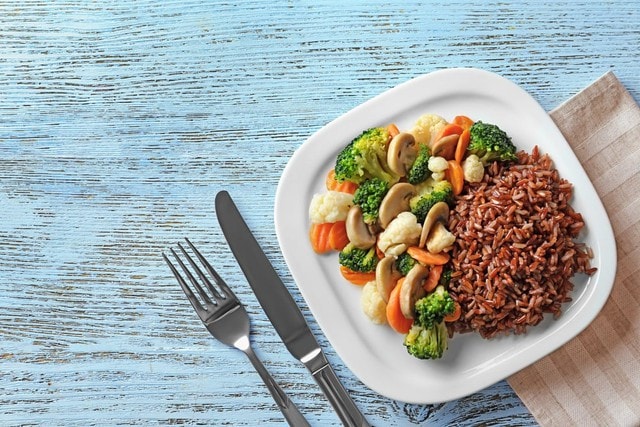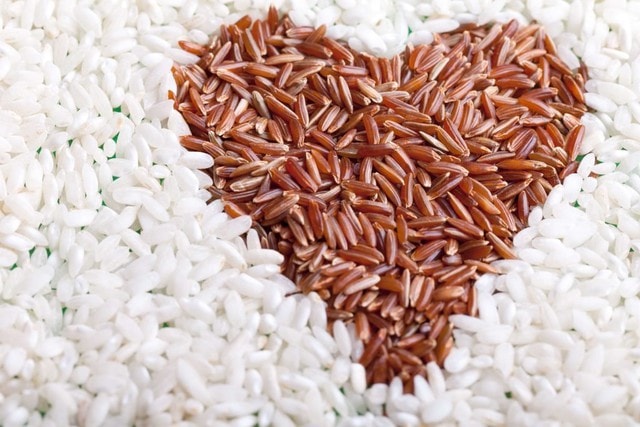7 amazing health benefits of eating brown rice
Brown rice is increasingly being chosen by many people to replace white rice. Brown rice contains many nutrients and brings many health benefits when eaten daily.
1. Nutritional value of brown rice
Brown rice is a whole grain that has only the outermost husk removed. This means that the original components of the rice grain, including the bran, germ, and endosperm, remain intact. Therefore, brown rice is a high-fiber, nutrient-dense food, containing beneficial phytochemicals such as fiber, minerals, essential amino acids, and flavonoids (antioxidants).
The United States Department of Agriculture (USDA) provides nutrition information for 1 cup (about 200g) of cooked brown rice: Calories: 218 Carbohydrate: 45.8g Fiber: 3.5g Magnesium: 85.8mg Fat: 1.6g Sugars: 0g Sodium: 2mg Protein: 4.5g
Brown rice is also packed with vitamins, minerals and essential fatty acids. This whole grain is packed with minerals, vitamins, fiber and plant protein and is a great source of slow-release energy to keep your body running smoothly throughout the day.
Adults can get at least 85% of their manganese needs from just one serving (one cup) of brown rice. Manganese is a mineral that helps support fertility, immune function, and bone strength.
2. Health benefits of eating brown rice
2.1 Brown rice helps lose weight
Adding brown rice to your daily diet can be beneficial for weight loss as well as weight management. Brown rice reduces calorie absorption due to its fiber content and improves calorie burning, two factors that have a positive impact on weight management.

2.2 Brown rice regulates blood sugar levels
Brown rice plays an important role in regulating blood sugar levels by keeping blood sugar levels low. It is also linked to a reduced risk of type 2 diabetes.
Scientists believe this benefit is due to the bran layer of brown rice, which takes longer to digest than white rice. This, in turn, prevents blood sugar spikes compared to white rice (where the bran layer is removed during processing).
Additionally, brown rice has a relatively lower glycemic index (GI) than white rice, meaning it does not cause blood sugar levels to rise as much after eating as white rice.
MSc. Dr. Nguyen Thu Yen: The high amount of fiber in brown rice will slow down the absorption of sugar into the blood. Brown rice also has a lower glycemic index, so after eating, blood sugar levels increase slowly.
2.3 Brown rice is good for heart health
Consuming brown rice may help reduce several factors that increase the risk of cardiovascular disease. In particular, these factors include high blood pressure, high cholesterol, and high blood lipids.
Additionally, the results of a small study on the effects of brown rice consumption on cardiovascular disease risk factors and inflammatory markers in 40 obese or overweight premenopausal women showed that a regular brown rice diet was shown to significantly reduce inflammatory markers and reduce the risk of cardiovascular disease.
2.4 Antioxidant effects of brown rice
Brown rice contains several antioxidants, including flavonoids, phenolic compounds, and anthocyanins. Antioxidants are powerful chemicals found in foods such as vegetables and fruits. Their power comes from their ability to prevent or delay certain types of cell damage.
Additionally, the phenolic compounds found in brown rice are known to protect cells against damage linked to an increased risk of obesity, type 2 diabetes, heart disease and cancer.

2.5 Brown rice is beneficial for people with gluten intolerance
Gluten allergy or intolerance can cause mild to severe symptoms such as diarrhea, stomach upset, vomiting and bloating in some people. Brown rice is naturally gluten-free, so it is beneficial for people with gluten intolerance. A gluten-free diet can also help people with certain autoimmune diseases.
2.6 Brown rice is good for bone health
Brown rice is rich in calcium, manganese, and magnesium, which help promote bone health. Just one cup of brown rice provides more than 20% of your daily magnesium needs.
Therefore, consuming brown rice as part of a balanced diet can help ensure adequate manganese intake, which can help prevent conditions like osteoporosis and promote healthy bones throughout life.
2.7 Brown rice diet can prevent cancer
According to scientific research, brown rice can significantly reduce the risk of colon cancer because it has high selenium content, which helps promote DNA repair and synthesis in damaged cells while preventing the growth of cancer cells.
Additionally, inositol hex phosphate, a chemical found naturally in fiber-rich foods, including brown rice, has been shown to have cancer-preventing properties.
According to Associate Professor, Dr. Nguyen Xuan Ninh - Deputy Director of the Vietnam Institute of Applied Medicine, when processing brown rice, you should soak the rice in warm water for at least 1-2 hours. The reason for soaking brown rice is because the soaking process helps remove arsenic in the rice as well as remove substances that cause indigestion, making the rice softer for easier cooking and eating. If cooking with beans or cooking brown rice and oatmeal porridge, you should soak the beans and oats at the same time to cook with the brown rice.


